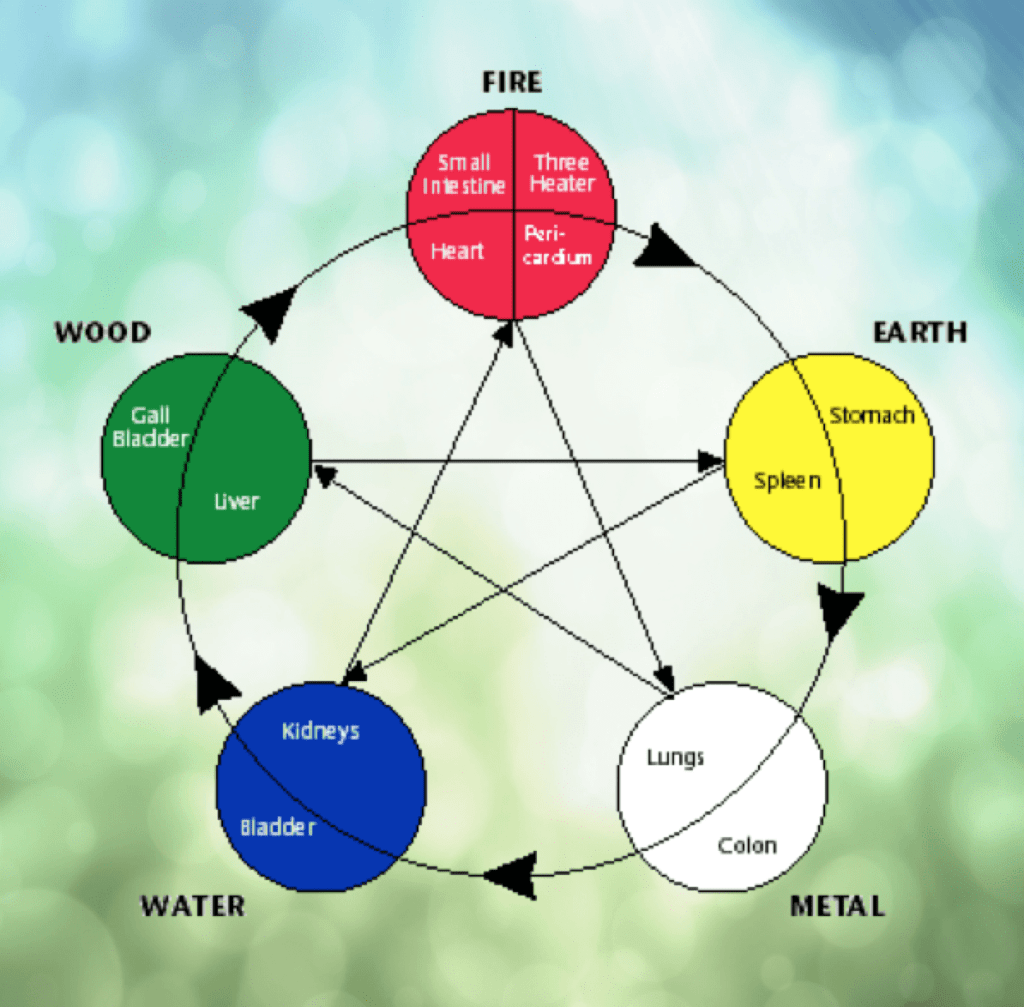
By Jane Barthelemy.
The Chinese five elements are said to arise out of the two energies Yin and Yang. And the five element system can be considered refinement or outgrowth of Yin Yang Theory. It is a system that has been used for thousands of years to describe the interactions between Yin and Yang and phenomena in Nature.
The Five Elements or Five Phases Describe Reality.
Each of the Five Elements represents an aspect of a dynamic process, or a phase of change. These are not actual physical descriptions, but metaphors of patterns that occur in Nature. The Five Elements and their qualities are represented by:
- Wood – Rising, nurturing, beginning, development, impulse, inspiration
- Fire – Expression, manifestation, definition, action, dynamic phase
- Earth – Balancing, supporting, centering, transmutation
- Metal – Reckoning, discerning, discipline, decisions
- Water – Contemplation, calmness, accepting, forgiving, observation
There are four cycles that describe the interactions between the five elements.
These cycles form a feedback system, a system of checks and balances which keeps the universe, the body, and our systems in balance.
- Creation cycle (Sheng)
- Controlling cycle (Ko)
- Insulting cycle (Wu)
- Overacting cycle (Cheng)
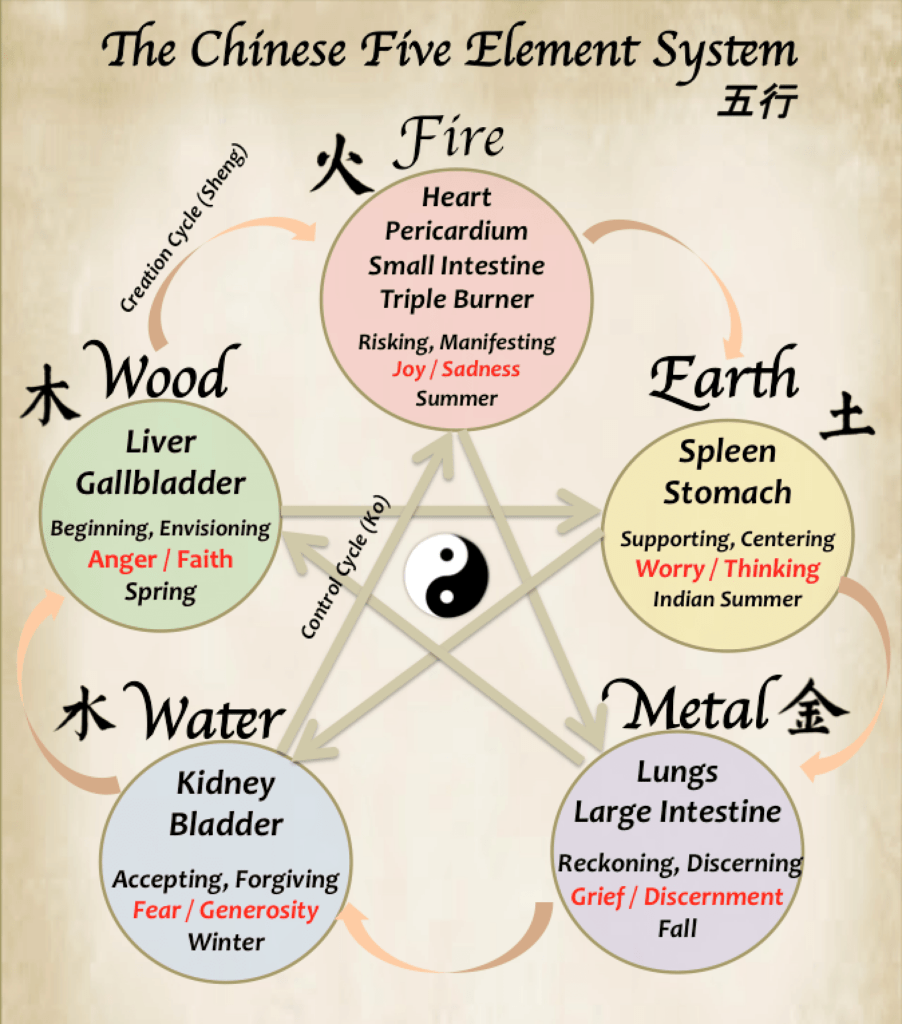
The Creation Cycle (Sheng)
Just as a Parent element bears and nurtures the Child, the Child gains from the Parent. Sheng has several translations from Chinese, meaning to generate, create, promote, nurture, support, or enhance. Thus the Sheng cycle continually brings growth, nurturing, change and transformation to our lives. For example:
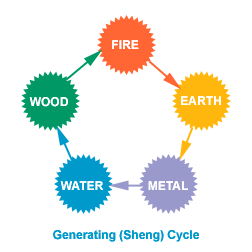
- Wood burns and thus nourishes Fire.
- Fire produces ash, creating Earth.
- Earth contains minerals which condense into Metal
- Metal heated and cooled creates condensation of Water.
- Water nourishes the growth of trees, creating wood.
The Control Cycle (Ko or Ke)
The Grandparent comes before the Parent (two back from Child). In Chinese culture, the Grandparent often raises and disciplines a Child, controlling it to help it come into balance. The control represents an opposing force that balances the generative creation power of the Parent. For example:
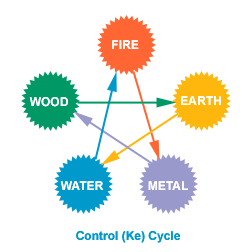
- Wood breaks up the Earth, as in the roots of a tree.
- Earth controls Water, as a dam or river bank.
- Water can dampen Fire, controlling its spread.
- Fire can melt Metal
- Metal can chop down Wood
The Insulting Cycle (Wu) Anti-Ko
The Insulting Wu cycle is the opposite of the Controlling Ko cycle. It represents an imbalance in the system. In the Insulting Wu cycle, the Child element that would normally be controlled and balanced by the Grandparent in the Ko cycle, becomes excessively imbalanced, and controls its Grandparent. It resists the control and reverses it, somewhat like a manipulative Grandchild.
For example, instead of Metal (axe) controlling Wood (tree), if Wood becomes overly excessive, it can “insult” Metal, ganging up on the Metal and overwhelming it, causing Metal to become imbalanced. This is like a rebellious child insulting or trying to discipline its Grandparent. In the insulting cycle that element which is normally controlled, harms the controller. This reversal of the normal Ko cycle can happen when the Grandparent element is deficient. For example:
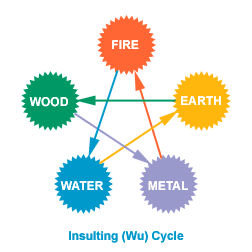
- Wood can overwhelm and cover Metal. Too much Wood insults Metal.
- Metal can smother Fire. Too much Metal insults Fire
- Fire can injure or evaporates Water. Too much Fire insults Water
- Water can wash away Earth. Too much Water insults Earth
- Earth can bury Wood. Too much Earth insults Wood
The Overacting (Cheng) Cycle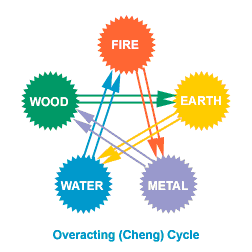
Another type of imbalance can create a pattern called the Overacting (Cheng) Cycle. This can happen when the Grandparent element, instead of beneficially controlling the Child, exerts too much control and damages or smothers the Child. The Grandparent “Overacts” and hurts the Child. The control direction is exactly the same as the Ko cycle, however in the Cheng it is excessively intense, indicated by double arrows.
- Wood over-exerts pressure on the Earth, totally depleting its nutrients.
- Earth over-controls Water, to smother it completely and the river disappears.
- Water extinguishes Fire altogether and there’s no more spark of enthusiasm.
- Fire over-melts Metal to the point that Metal vaporizes and disappears.
- Metal chops all the Wood, such as mankind’s machines destroy all the forests.


